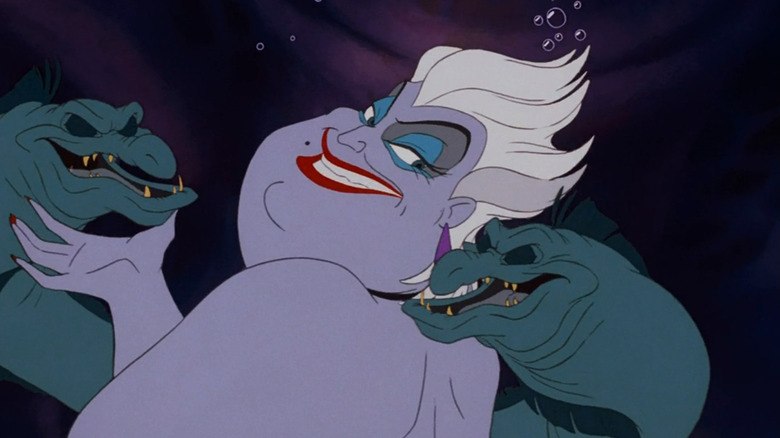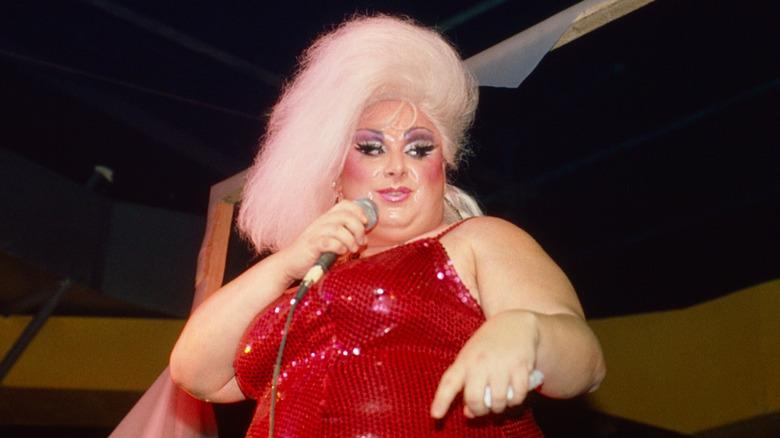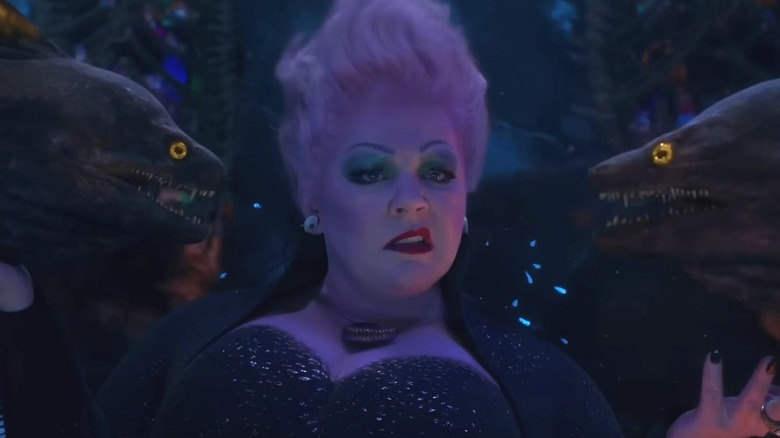The Real-Life Drag Queen Who Inspired The Little Mermaid's Ursula
"The Little Mermaid" is the animated film that launched Disney's Renaissance era and relaunched Disney's bank account. Before Ariel (Jodi Benson) rejected the ocean, her family, and her friends to marry a sailor prince, the studio that now controls everything from the Marvel Cinematic Universe to the "Star Wars" franchise was on the verge of bankruptcy.
And while the sweeping score and relatable lyrics of Howard Ashman and Alan Menken are undoubtedly at the forefront of why the film became so successful, a story is only ever as interesting as its villain, and Ursula (Pat Carroll) is a top-tier low-life. Triton's (Kenneth Mars) wicked sister shone in every possible way, from her silver-tongued dialogue to her instantly recognizable aesthetic, and all of it was inspired by one performer, Divine, a.k.a Glenn Milstead, a drag queen icon.
With Disney's second adaptation of the classic Hans Christian Anderson tale looming over the horizon (fourth, if you count "The Little Mermaid II: Return to the Sea" and the subsequent television series), it's the perfect time to look back at the star who unknowingly lent their likeness and spirit to one of the greatest villains of all time.
Divine changed the game for how drag queens were allowed to act
As Divine, Glenn Milstead starred in a series of films, mostly helmed by John Waters, that earned him a name as a character that audiences loved to hate. The persona was both an homage and a criticism of how drag queens were allowed to be during the 1970s and 1980s. Others in the community displayed themselves as caricatures of grace and decorum. But that wasn't Divine. Divine was crass, Divine was loud, Divine was everything a drag queen wasn't supposed to be, and audiences lapped it up.
Yes, some of Divine's antics were NSFW, even by today's standards — how many films are going to feature a person eating freshly eaten dog poo or masturbating with a fish? But the point was drag queens could be anything they wanted to be, even if it wasn't what societal parameters dictated. It's a shame that the drag community is still fighting that same battle today.
Milstead passed away due to heart failure in 1988, just over a year before "The Little Mermaid" was released in theaters, so he never got to see the full scale of his impact on popular culture. That scale is ever-growing, even still, with Ursula officially appearing everywhere, from Broadway to video games. But the unofficial ways that Ursula appears in culture prove her staying power.
Ursula might hate Triton but she loves herself and audiences loved her because of it
It is a stereotype universally mocked that, in a certain kind of media, inner goodness manifests as outer beauty, and inner wickedness manifests as outer ugliness. In these cases, beauty is loosely defined as whatever is the current, popular standard for attractiveness, and ugliness is any number of deviations from that unattainable goal. It has never not been a regressive, stigmatizing trope. On the surface, it might seem as though Ursula falls into that harmful camp, except that she doesn't, not actually. Her appearance is never once acknowledged as an aspect of her villainy. What's more, she's clearly dripping with confidence. Who else can sell the "body language" line but a person with an ironclad self-image?
And audiences clocked it. Cosplayers frequently don Urusla's likeness at conventions. Disney fans around the globe rock out to her power ballad at karaoke. Tiktokers rake in views by showcasing Urusla's makeup online. Sure, Ursula might have used Ariel as live bait to lure her father into a state of weakness so that she could steal command over the ocean and all its inhabitants, but she did it with style and presence. And to emulate her is to hold a lightning rod that demands better self-worth.
Pat Carrol channeled it. Hopefully, Melissa McCarthy will channel it, too. But it all stems from one drag queen who despised the box she was forced to live within. So she did something about it and helped reshape the stories we collectively tell.


